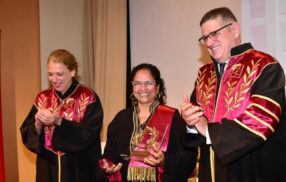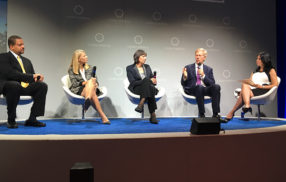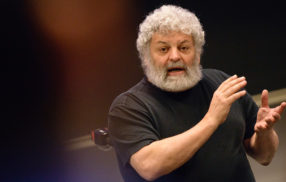Ideas to Action San Francisco: UVA Darden Professors Tell the ‘New Story of Business’
By Kristin Kloberdanz
University of Virginia Darden School of Business Professors Ed Freeman and Bobby Parmar presented their talk, The New Story Business, to a standing room-only crowd in San Francisco on 17 July.
Addressing an audience of more than 125 UVA and Darden alumni, current and prospective students, and Bay Area business leaders, Freeman and Parmar began with a warning to Silicon Valley businesses with recent technological and ethical lapses. “You better get your act together,” Freeman said. “If you think of some recent disasters, like what Uber and Facebook and others have been through in the past year or so, you shouldn’t have to look very far before you realize we have to figure this stuff out now.”
For several years, Freeman and Parmar have been thinking about how companies can practice responsible disruption — the processes, skills and tools they will need to navigate ethical challenges amid the innovation and uncertainties all around them. Their new framework is central to “the new story of business,” in which business is about more than just profits. Silicon Valley’s position as the technology and innovation epicenter of the world made it a fitting backdrop for the talk.
Presented by Darden’s Batten Institute for Entrepreneurship & Innovation and Institute for Business in Society at The Battery in San Francisco’s Financial District, the event was part of the new global Darden Ideas to Action thought-leadership series. The talk will be one of several addressing important issues at the intersection of ethics, technology, entrepreneurship and innovation.
“I come tonight with good news,” Freeman told the audience. “In my view, there is a revolution happening. It’s a revolution in the way we think about business, and it is going on around the world. It’s being written by entrepreneurs, people working in high tech, social entrepreneurs, people who identify themselves as conscious capitalists, inclusive capitalists, capitalism 2.0, and those with a renewed interest in corporate social responsibility and sustainability.”
If you track what has happened since the 2008 global financial crisis, Freeman said, what you find is an explosion of “new models of business.” These are businesses that are socially responsible, purpose-driven and sustainable. In order for these organizations to thrive and for others to take similar paths, modern culture needs to dispense with the common perception that business is nothing but a “bunch of greedy bastards trying to do each other in.”
Parmar discussed how he believes business leaders can make a difference. “More and more, we’re finding that leaders and organizations are facing uncertain, turbulent, high-stakes situations where there are lots of conflicting interpretations on how to answer ethical questions,” he said. “We’re living at a time where our business models are very easy to disrupt because of an ethical blind spot that leads to a backlash from different stakeholder groups, whether those are employees, communities or investors.”
This is not just the price of innovation. “Many of us know we can do better and we want to,” Parmar said.
He believes that leaders of companies big and small should look to high reliability organizations that have a track record for minimizing and containing mistakes. These are organizations like nuclear power plants, aircraft carriers and hospitals that must have a hefty network of systems and processes in place to avoid crucial mistakes.
The more you talk about mistakes within your organization, he said, the less likely they are to happen. Train managers to accept criticism and learn from it. Deeply embed ethics and values across all operations.
Providing an example, Parmar said that Salesforce is a company that has worked hard to react strongly and swiftly at the slightest sign that something is wrong. “Both the devil and the angel are in the details,” he said. “If we want to be ethical, we have to act ethically.”
Freeman reminded everyone that they should be thinking both long and short term.
“Life exists in the short term,” he said. “It exists in the now. Do the right things now and then keep it up, and you’ll have a great long term. Get rid of these myths, these easy dualities … that are absolutely destructive to creating new innovations in businesses.”
Corey Vernon, a 2013 UVA McIntire School of Commerce alumna and senior associate at Radicle Impact, a social-impact investment fund, agreed with the necessity for a new story of business. “I believe that we will not solve the largest problems that we face as a society — extreme income inequality and climate change — until we, as articulated by Professors Ed Freeman and Bobby Parmar, write a new story of business,” she said. “Professor Freeman’s analogy particularly resonated, that believing the purpose of business is to make profit is like believing the purpose of life is to make red blood cells. It is necessary, but not the goal.”
The University of Virginia Darden School of Business prepares responsible global leaders through unparalleled transformational learning experiences. Darden’s graduate degree programs (MBA, MSBA and Ph.D.) and Executive Education & Lifelong Learning programs offered by the Darden School Foundation set the stage for a lifetime of career advancement and impact. Darden’s top-ranked faculty, renowned for teaching excellence, inspires and shapes modern business leadership worldwide through research, thought leadership and business publishing. Darden has Grounds in Charlottesville, Virginia, and the Washington, D.C., area and a global community that includes 18,000 alumni in 90 countries. Darden was established in 1955 at the University of Virginia, a top public university founded by Thomas Jefferson in 1819 in Charlottesville, Virginia.
Press Contact
Molly Mitchell
Associate Director of Content Marketing and Social Media
Darden School of Business
University of Virginia
MitchellM@darden.virginia.edu







